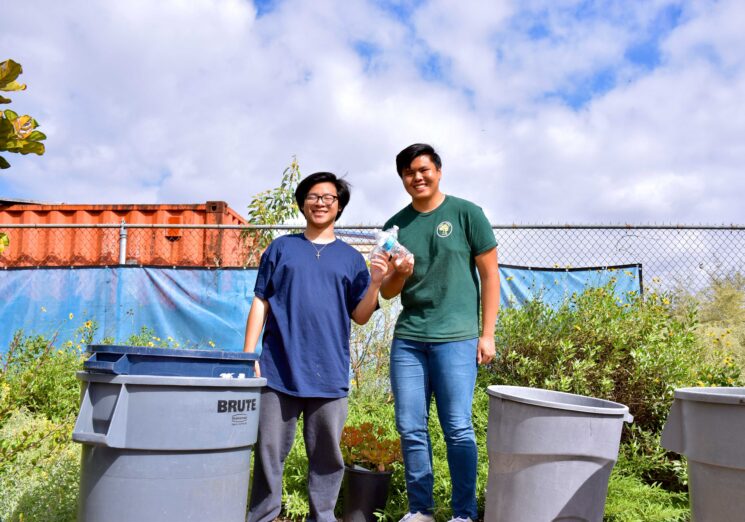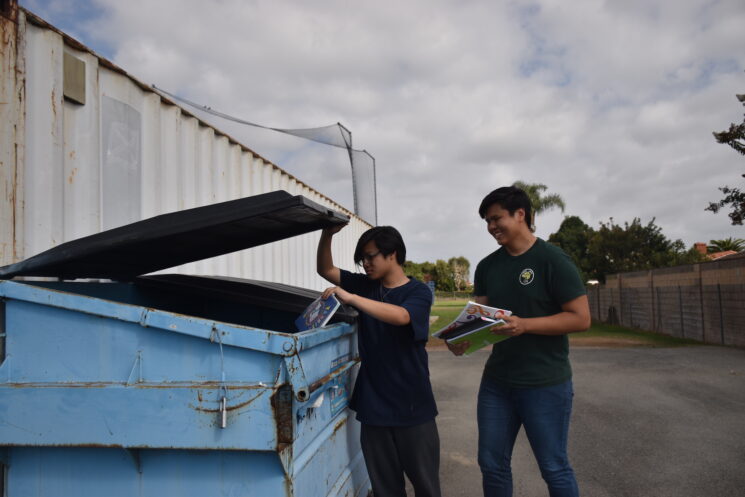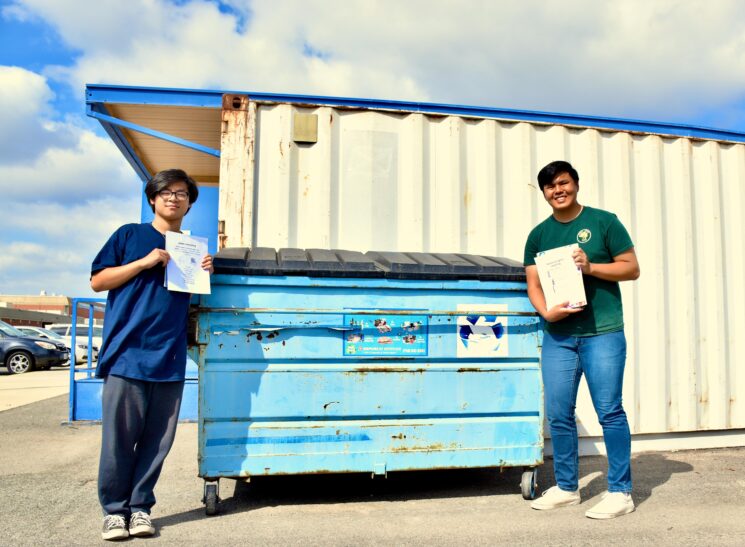
By Hannah Park
Disclaimer: Hannah Park is the Ocean-Friendly Garden Director of Ecology Club.
This month, Ecology Club and Public Works Club (PWC) will upgrade the recycling system at Fountain Valley High School (FVHS). The clubs will place new recycling bins in the cafeteria, a greater number of classrooms and eventually the whole campus.
Their goal is not only to reduce waste at FVHS but to promote environmental awareness. That is, they hope to change student habits: everyone wants to “save the environment,” but far fewer take action in their day-to-day lives.
“[We] want to inspire students to have more respect for the environment,” senior Alan Luupham, the president of Ecology Club, said. “I want to [make] the campus a lot cleaner.”
Last year, the recycling program was limited to 50 classrooms based on teacher interest; this amounted to around a quarter of the staff. Each week, Advanced Placement Environmental Science (APES) students collected the recycling. Then, Ecology Club members separated plastic, aluminum and paper recyclables. Finally, representatives from Edison High School’s recycling program took sorted bags to a recycling center—the two schools maintain a working partnership.

The program had met with considerable success, considering the fact that it started just a few years ago. Giauy Ngo, a college freshman and Ecology Club’s former president, restarted FVHS’s recycling program after a long period without any recycling on campus. Ngo’s hard work saved thousands of plastics and aluminum cans from the dumpsters.
Still, the scope of the recycling program was nowhere near enough to cover FVHS’s entire plastic and aluminum footprint. Senior Collin Choe discovered a problem while attending the Spanish Salsa Concert last spring.
“We were just hanging out … and we noticed that there were a lot more cans than usual [due to the event],” Choe said. “There was actually no place to put [them] besides the on-campus trash bins. That really opened us to the fact that, ‘Oh, there’s no recycling bins on campus right now.’”
Choe raised an important issue: FVHS’s recycling program was only limited to a few classrooms. Like many other students, he wasn’t aware that a recycling program existed, let alone the locations of the few bins. Determined to change the situation, Choe (the current Activities Director of PWC) asked PWC to support Ecology Club’s efforts. The PWC Presidents, seniors Khoi Pham and Mason Tran, gave Choe the go-ahead to lead the project.
“One of the key ideas of Public Works Club is to … try and better the community as a whole,” Choe said. “This really aligns with our [mission] of trying to help out in any way that we can.”
During the summer, Choe and Luupham worked out the details. Luupham (Ecology Club) focused on the classroom bins, while Choe (PWC) prioritized the cafeteria and the lunch tables outside the Bowl. Rachel Kloppenburg, the assistant principal of curriculum and instruction, helped plan bin maintenance and pitch the program to the FVHS administration.
However, the team faced significant hurdles. Recycling bins need to be emptied and cleaned out, which requires the help of the school maintenance staff. Luupham is currently working towards an arrangement.
“Maintenance [already] picks up trash and keeps everything clean. If we do implement the bins [outside the classrooms], maintenance will have a lot of work to do,” Luupham said. “We don’t want to put stress on them.”
However, with the additional help from PWC, student volunteers can help lighten the load. Although there is only one APES period this year, compared to the three last year, Luupham plans to enlist extra help.
“We’re thinking about asking [Lisa] Battig to have her Marine Biology students help out, too,” Luupham said.
So, how can Barons do their part? For one, they can do their best to support the new system by recycling correctly and spreading the word.
“[Students should] be more mindful about how their actions impact the environment,” Luupham said. “Make sure that [you] don’t just use [the bins] as regular trash cans.”

APES teacher Terah French hopes that students will also do their own research. Recycling can do wonders for the environment, but it shouldn’t be the “end-all, be-all.”
“Reduce, Reuse, Recycle,” French said. “Ideally, students should use reusable flasks and our water-filling stations. Recycling should be the last option, not the first.”
As global consumption increases, every bottle recycled is a crucial victory. Be sure to use the recycling bins this month. And, if you’re feeling inspired, consider joining Ecology Club (which meets every Thursday in Room 509) or Public Works Club (which meets every Tuesday in Room 403).





